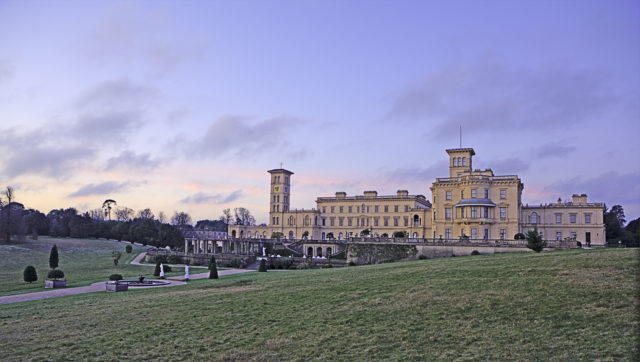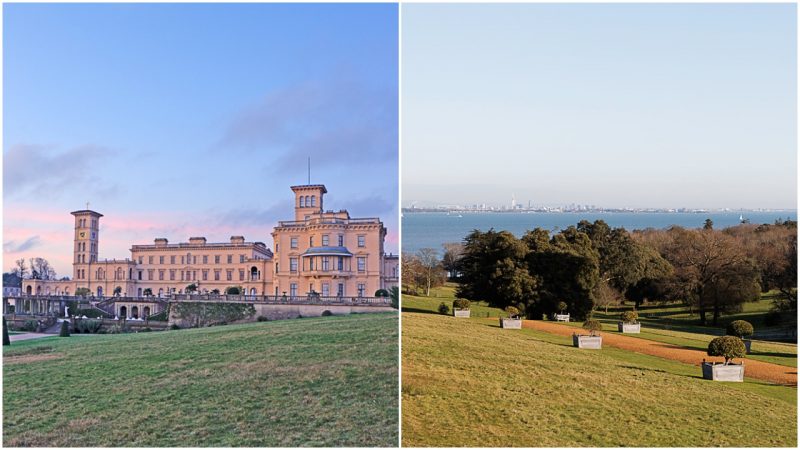Devoted royal couple Queen Victoria and Prince Albert once loved taking in the sunsets at Osborne House, standing on their terrace on the Isle of Wight. Now visitors can do the same.
The house was personally designed by Prince Albert as a summer house for the family and a place of retreat. While the property has been opened for visitors for the last two decades, the Osborne House garden, and its terrace, was one of the spots that wasn’t. The terrace needed to first undergo a major restoration project, with an estimated cost of $780,000.
An astounding Andromeda fountain, which was bought by Queen Victoria during the Great Exhibition of 1851, is the centerpiece. Thanks to the latest restoration, the fountain has been fully brought back to life, as has a shell alcove, adorned with thousands of seashells collected from the beach just below the residence.

Samantha Stones from English Heritage, who has been the properties curator at Osborne House, said that “Queen Victoria loved to be outside in the fresh sea air and the terrace was a place of peace.”
She added, “Opening this previously closed space to visitors gives them another glimpse into the private lives of the royal couple.”

The property was bought by the monarch in 1845 and Prince Albert was determined to make it impress in the style of an Italian Renaissance palazzo. He commissioned London architect Thomas Cubitt to rebuild the residence, the very same architect who would work on the main facade of Buckingham Palace in 1847.
Queen Victoria’s Osborne House ‘fully restored’ https://t.co/q2euW8o1wk pic.twitter.com/cPBU2v6UEi
— Property Guy (@newhomeschap) June 29, 2017
Aside from the great fountain and the shell alcove, guests can take in the garden’s 19th century planting scheme and its famous royal myrtle plant, which was a gift to the Queen from Prince Albert’s grandmother. It is the exact same myrtle that has traditionally been used in royal wedding bouquets ever since the marriage of Queen Victoria’s eldest daughter. The myrtle plant took its place in the Duchess of Cambridge’s bouquet when she married Prince William in 2011.
The panoramic view from the terrace opens over the Solent, a sight that Prince Albert compared to the Bay of Naples, further adding to the delight.
Queen Victoria’s Osborne House Is Now Letting Visitors See The Famous Royal Myrtle Plant https://t.co/0PNMIBspt9 pic.twitter.com/rpP8DiBpqt
— TOWN&COUNTRY (@TandCmag) June 29, 2017
The walls of the terrace also underwent restoration, now being returned to the original Italian-sun inspired “Osborne yellow,” to match the rest of the house. Stones points out that all conservation work brings the terrace back to Albert’s original plans for the royal house, including the matching color of the walls, the shell alcove with its aqua blue canopy, and the Andromeda fountain and its sea monsters now returned to full working order. The entire effort has brought life back to the terrace.
The terrace project involved the work of many. Big thanks to @CRLRestoration, @CricksmithACR, the volunteers and everyone else who helped! pic.twitter.com/84BrQtyEj0
— Osborne (@EHOsborneHouse) June 28, 2017
Osborne House was gifted to the nation by King Edward VII in honor and memory of his mother, Queen Victoria, following her death in 1901.
Some rooms within the historic royal estate have been closed to the public and untouched for ages, including two officers’ bedrooms.
Far away from Windsor Castle, Osborne House was considered Queen Victoria’s favorite royal residence. The Queen would especially praise the beach below the house, and it was there that her oldest son, the future king, learned how to swim and where he would spend any idle time collecting shells.
Today the lower terrace opens to the public for the first time. Enjoy it just as Victoria did 150 years ago https://t.co/0FOQrmu6Tm pic.twitter.com/UJHtzPyV1H
— Osborne (@EHOsborneHouse) June 28, 2017
Prince Albert died a decade after Osborne House was finished, but Queen Victoria continued visiting for another 40 years. The Queen would also welcome prominent royal guests and foreign notables, including Tsar Nicholas and Emperor Napoleon III.
It is here where Queen Victoria spent the last days of her life. After spending Christmas of 1900 at Osborne, in early January she began feeling unwell and weak. She died weeks later at the age of 81 .
After the Queen’s death, things changed at the residence. After Edward VII gave the property to the state, part of it was adjusted to become a convalescent home for officers, for whom the beach’s unique bathing pavilion had been built.
The gardeners at Osborne putting the finishing touches to the terrace ready for tomorrow’s opening. https://t.co/h8nMRDSCeK pic.twitter.com/TtUllb3MMq
— Osborne (@EHOsborneHouse) June 27, 2017
A Royal Navy College also opened at Osborne House in 1903, and it operated for nearly two decades. Throughout WWII, the entire Osborne Bay served as a place for training soldiers before conducting the D-Day landings.
Read another story from us: The Resolute desk in the Oval office, a gift from Queen Victoria
In 1954, it was Queen Elizabeth II who allowed the property to be opened to the public, while English Heritage took over management somewhat later, conducting a number of restoration and conservation projects.
